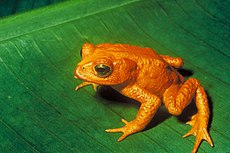
Summary
A near-threatened species is a species which has been categorized as "Near Threatened" (NT) by the International Union for Conservation of Nature (IUCN) as that may be vulnerable to endangerment in the near future, but it does not currently qualify for the threatened status.[1][2]
| Conservation status | |
|---|---|
 | |
| Extinct | |
| Threatened | |
| Lower Risk | |
Other categories | |
| (list) | |
Related topics | |
 Comparison of Red List classes above and NatureServe status below  | |
The IUCN notes the importance of re-evaluating near-threatened taxa at appropriate intervals.
The rationale used for near-threatened taxa usually includes the criteria of vulnerable which are plausible or nearly met, such as reduction in numbers or range. Near-threatened species evaluated from 2001 onwards may also be ones which are dependent on conservation efforts to prevent their becoming threatened, whereas before this conservation-dependent species were given a separate category ("Conservation Dependent").
Additionally, the 402 conservation-dependent taxa may also be considered near-threatened.
IUCN Categories and Criteria version 2.3 edit
Before 2001, the IUCN used the version 2.3 Categories and Criteria to assign conservation status, which included a separate category for conservation-dependent species ("Conservation Dependent", LR/cd). With this category system, Near Threatened and Conservation Dependent were both subcategories of the category "Lower Risk". Taxa which were last evaluated before 2001 may retain their LR/cd or LR/nt status, although had the category been assigned with the same information today the species would be designated simply "Near Threatened (NT)" in either case.
Gallery edit
-
The near-threatened Eurasian otter
-
The maned wolf is near-threatened largely as the result of habitat loss.
-
-
Plains zebras (or Equus quagga) are listed as 'near threatened' by the IUCN.
-
The ball python, formerly a common species, had become near-threatened as a result of illegal trades and poaching.
See also edit
- IUCN Red List near threatened species, ordered by taxonomic rank.
- Category:IUCN Red List near threatened species, ordered alphabetically.
- List of near threatened amphibians
- List of near threatened arthropods
- List of near threatened birds
- List of near threatened fishes
- List of near threatened insects
- List of near threatened invertebrates
- List of near threatened mammals
- List of near threatened molluscs
- List of near threatened reptiles
References edit
- ^ "What are The IUCN Red List Categories and Criteria?". IUCN Red List. IUCN. Archived from the original on 11 August 2020. Retrieved 11 August 2020.
- ^ "SUMMARY OF THE FIVE CRITERIA (A-E) USED TO EVALUATE IF A TAXON BELONGS IN AN IUCN RED LIST THREATENED CATEGORY (CRITICALLY ENDANGERED, ENDANGERED OR VULNERABLE)" (PDF). IUCN Red List. IUCN. Archived (PDF) from the original on 9 August 2020. Retrieved 11 August 2020.
- ^ "Myotis grisescens status". IUCN Red List of Threatened Species. IUCN. 24 February 2017. Archived from the original on 25 October 2020. Retrieved 11 August 2020.
External links edit
- List of Near Threatened species as identified by the IUCN Red List of Threatened Species


